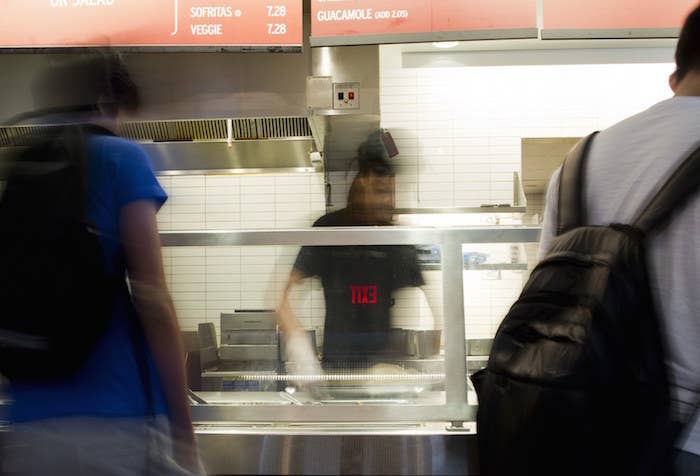
Most of us are guilty of going to work when we're sick. But in the restaurant industry, that illness can quickly spread not only to coworkers, but also to customers. As Chipotle's outbreaks of norovirus, E. coli and salmonella last year showed, the consequences of sick restaurant employees coming to work can be devastating.
Altogether, the outbreaks dragged down sales by 14.6% in the final three months of 2015. In January, comparable sales continued to fall by about 36%. For a company doing a billion dollars in sales per quarter, a drop like that is a costly problem, but the true cost goes well beyond that. Chipotle's brand has been seriously tarnished, and recovery will be expensive.
"We all need to commit today not to let this happen again: we must not allow employees to work when they are sick. Norovirus outbreaks are avoidable if our existing protocols are followed," said Chipotle co-CEO Monty Moran to workers during an all-hands meeting broadcast via satellite on Feb. 8.
Yet the damage had already been done. What's baffling is that companies — and restaurants in particular — haven't tried harder to keep sick workers home all along.
The lack of paid leave in an industry largely staffed by low-income workers creates a dangerous incentive. In a nationwide survey of 4,323 restaurant workers conducted by the Restaurant Opportunities Center (ROC), a worker advocacy group, two out of three workers reported cooking, preparing, and serving food while sick.
The consequences are dire, and expensive. Infected food workers cause about 70% of reported norovirus outbreaks from contaminated food, according to the Centers for Disease Control and Prevention. Each year, norovirus costs about $2 billion in the United States for healthcare and lost productivity from foodborne illness, according to the agency.
Last July, Chipotle rolled out paid sick leave, a surprisingly rare benefit in the restaurant business. Nationwide, only two-thirds of American workers have access to paid sick leave, according to the Bureau of Labor Statistics, but in the restaurant industry it is far lower: an estimated 90% of restaurant workers don’t receive paid sick days, according to the ROC.
While a number of restaurant chains, such as Starbucks, offer employees some paid time off that they can use when ill, they do not have paid sick leave policy per se, except in states and cities that require it.
Saru Jayaraman, co-director of ROC, said that while Chipotle has received a lot of attention for its recent health issues, it's by no means an outlier in the industry.
"Norovirus is so pervasive in our industry, and it's because chains lobby through the NRA [National Restaurant Association] against paid sick leave legislation," she said. "Chains are really responsible for setting standards both legislatively and in terms of industry norms." She added that that workers who take time off, even for illness, are frequently fired or punished with poor shifts when they return.
National Restaurant Association spokesperson Christin Fernandez said in an email that the industry group had "opposed certain mandates in the past as they have been overly onerous to small businesses." As for requesting time off, Fernandez responded that "flexibility with regards to scheduling, whether it’s sick time or personal time... is a trademark of the restaurant industry."
Chipotle is now raising awareness of the need for workers to stay home when sick and has tightened protocols for addressing illness in the restaurant. "When anyone vomits in the back of the house or the front line, this is a red event, which means we close the restaurant immediately," Gretchen Selfridge, a Chipotle restaurant support officer, said in an AP report.
The chain said it offers three paid sick days a year, and in cases where exceptionally sick employees are sent home and told not to work for five days, they will still be paid. Chipotle did not respond to emailed inquiries about whether paid sick leave was offered to all workers or only those who had been with the company for some time.
Paid sick leave has gained the attention of lawmakers.
In September, President Obama signed an Executive Order requiring federal contractors to allow their employees to earn up to seven days of paid sick leave per year, effective 2017.
According to the Department of Labor, there are earned sick time laws Connecticut, California, Massachusetts Washington, D.C., and Oregon; 22 local jurisdictions including New York City, Pittsburgh, Pennsylvania, and a few cities in New Jersey have enacted legislation or approved paid sick leave programs by voter referendum.
"The safety of employees and diners should be priority number one for any restaurant," said Fernandez. "That’s why we always encourage restaurateurs and their employees to follow the model food code and take sick time when needed."

